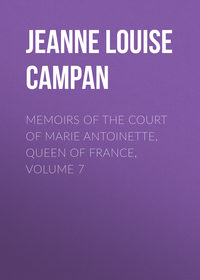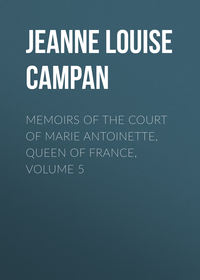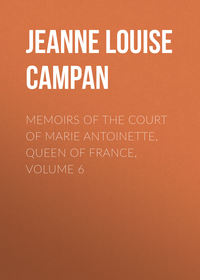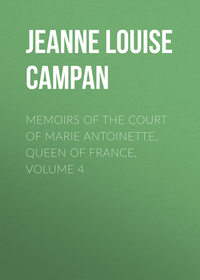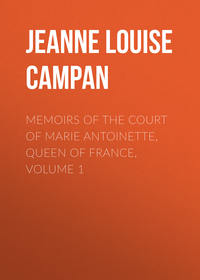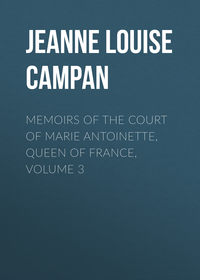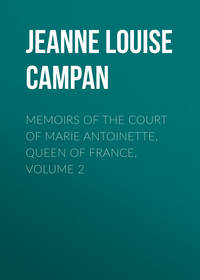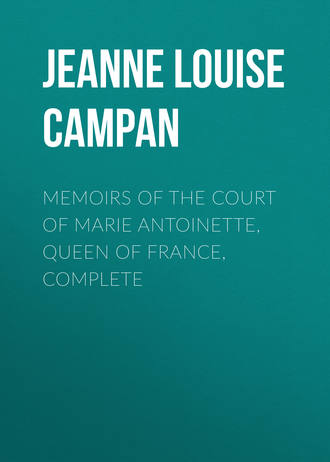 полная версия
полная версияMemoirs of the Court of Marie Antoinette, Queen of France, Complete
On the death of my father-in-law his executors placed in my hands a box containing a few jewels deposited by the Queen with M. Campan on the departure from Versailles of the 6th of October, and two sealed packets, each inscribed, “Campan will take care of these papers for me.” I took the two packets to her Majesty, who kept the jewels and the larger packet, and, returning me the smaller, said, “Take care of that for me as your father-in-law did.”
After the fatal 10th of August, 1792,—[The day of the attack on the Tuileries, slaughter of the Swiss guard, and suspension of the King from his functions.]—when my house was about to be surrounded, I determined to burn the most interesting papers of which I was the depositary; I thought it my duty, however, to open this packet, which it might perhaps be necessary for me to preserve at all hazards. I saw that it contained a letter from the Abbe de Vermond to the Queen. I have already related that in the earlier days of Madame de Polignac’s favour he determined to remove from Versailles, and that the Queen recalled him by means of the Comte de Mercy. This letter contained nothing but certain conditions for his return; it was the most whimsical of treaties; I confess I greatly regretted being under the necessity of destroying it. He reproached the Queen for her infatuation for the Comtesse Jules, her family, and society; and told her several truths about the possible consequences of a friendship which ranked that lady among the favourites of the Queens of France, a title always disliked by the nation. He complained that his advice was neglected, and then came to the conditions of his return to Versailles; after strong assurances that he would never, in all his life, aim at the higher church dignities, he said that he delighted in an unbounded confidence; and that he asked but two things of her Majesty as essential: the first was, not to give him her orders through any third person, and to write to him herself; he complained much that he had had no letter in her own hand since he had left Vienna; then he demanded of her an income of eighty thousand livres, in ecclesiastical benefices; and concluded by saying that, if she condescended to assure him herself that she would set about procuring him what he wished, her letter would be sufficient in itself to show him that her Majesty had accepted the two conditions he ventured to make respecting his return. No doubt the letter was written; at least it is very certain that the benefices were granted, and that his absence from Versailles lasted only a single week.
In the course of July, 1789, the regiment of French guards, which had been in a state of insurrection from the latter end of June, abandoned its colours. One single company of grenadiers remained faithful, to its post at Versailles. M. le Baron de Leval was the captain of this company. He came every evening to request me to give the Queen an account of the disposition of his soldiers; but M. de La Fayette having sent them a note, they all deserted during the night and joined their comrades, who were enrolled in the Paris guard; so that Louis XVI. on rising saw no guard whatever at the various posts entrusted to them.
The decrees of the 4th of August, by which all privileges were abolished, are well known.
[“It was during the night of the 4th of August,” says Rivarol, “that the demagogues of the nobility, wearied with a protracted discussion upon the rights of man, and burning to signalise their zeal, rose all at once, and with loud exclamations called for the last sighs of the feudal system. This demand electrified the Assembly. All heads were frenzied. The younger sons of good families, having nothing, were delighted to sacrifice their too fortunate elders upon the altar of the country; a few country cures felt no less pleasure in renouncing the benefices of others; but what posterity will hardly believe is that the same enthusiasm infected the whole nobility; zeal walked hand in hand with malevolence; they made sacrifice upon sacrifice. And as in Japan the point of honour lies in a man’s killing himself in the presence of the person who has offended him, so did the deputies of the nobility vie in striking at themselves and their constituents. The people who were present at this noble contest increased the intoxication of their new allies by their shouts; and the deputies of the commons, seeing that this memorable night would only afford them profit without honour, consoled their self-love by wondering at what Nobility, grafted upon the Third Estate, could do. They named that night the ‘night of dupes’; the nobles called it the ‘night of sacrifices’.”—NOTE BY THE EDITOR.]
The King sanctioned all that tended to the diminution of his own personal gratifications, but refused his consent to the other decrees of that tumultuous night; this refusal was one of the chief causes of the ferments of the month of October.
In the early part of September meetings were held at the Palais Royal, and propositions made to go to Versailles; it was said to be necessary to separate the King from his evil counsellors, and keep him, as well as the Dauphin, at the Louvre. The proclamations by the officers of the commune for the restoration of tranquillity were ineffectual; but M. de La Fayette succeeded this time in dispersing the populace. The Assembly declared itself permanent; and during the whole of September, in which no doubt the preparations were made for the great insurrections of the following month, the Court was not disturbed.
The King had the Flanders regiment removed to Versailles; unfortunately the idea of the officers of that regiment fraternising with the Body Guards was conceived, and the latter invited the former to a dinner, which was given in the great theatre of Versailles, and not in the Salon of Hercules, as some chroniclers say. Boxes were appropriated to various persons who wished to be present at this entertainment. The Queen told me she had been advised to make her appearance on the occasion, but that under existing circumstances she thought such a step might do more harm than good; and that, moreover, neither she nor the King ought directly to have anything to do with such a festival. She ordered me to go, and desired me to observe everything closely, in order to give a faithful account of the whole affair.
The tables were set out upon the stage; at them were placed one of the Body Guard and an officer of the Flanders regiment alternately. There was a numerous orchestra in the room, and the boxes were filled with spectators. The air, “O Richard, O mon Roi!” was played, and shouts of “Vive de Roi!” shook the roof for several minutes. I had with me one of my nieces, and a young person brought up with Madame by her Majesty. They were crying “Vive le Roi!” with all their might when a deputy of the Third Estate, who was in the next box to mine, and whom I had never seen, called to them, and reproached them for their exclamations; it hurt him, he said, to see young and handsome Frenchwomen brought up in such servile habits, screaming so outrageously for the life of one man, and with true fanaticism exalting him in their hearts above even their dearest relations; he told them what contempt worthy American women would feel on seeing Frenchwomen thus corrupted from their earliest infancy. My niece replied with tolerable spirit, and I requested the deputy to put an end to the subject, which could by no means afford him any satisfaction, inasmuch as the young persons who were with me lived, as well as myself, for the sole purpose of serving and loving the King. While I was speaking what was my astonishment at seeing the King, the Queen, and the Dauphin enter the chamber! It was M. de Luxembourg who had effected this change in the Queen’s determination.
The enthusiasm became general; the moment their Majesties arrived the orchestra repeated the air I have just mentioned, and afterwards played a song in the “Deserter,” “Can we grieve those whom we love?” which also made a powerful impression upon those present: on all sides were heard praises of their Majesties, exclamations of affection, expressions of regret for what they had suffered, clapping of hands, and shouts of “Vive le Roi! Vive la Reine! Vive le Dauphin!” It has been said that white cockades were worn on this occasion; that was not the case; the fact is, that a few young men belonging to the National Guard of Versailles, who were invited to the entertainment, turned the white lining of their national cockades outwards. All the military men quitted the hall, and reconducted the King and his family to their apartments. There was intoxication in these ebullitions of joy: a thousand extravagances were committed by the military, and many of them danced under the King’s windows; a soldier belonging to the Flanders regiment climbed up to the balcony of the King’s chamber in order to shout “Vive le Roi!” nearer his Majesty; this very soldier, as I have been told by several officers of the corps, was one of the first and most dangerous of their insurgents in the riots of the 5th and 6th of October. On the same evening another soldier of that regiment killed himself with a sword. One of my relations, chaplain to the Queen, who supped with me, saw him stretched out in a corner of the Place d’Armes; he went to him to give him spiritual assistance, and received his confession and his last sighs. He destroyed himself out of regret at having suffered himself to be corrupted by the enemies of his King, and said that, since he had seen him and the Queen and the Dauphin, remorse had turned his brain.
I returned home, delighted with all that I had seen.
I found a great many people there. M. de Beaumetz, deputy for Arras, listened to my description with a chilling air, and, when I had finished, told me that all that had passed was terrific; that he knew the disposition of the Assembly, and that the greatest misfortunes would follow the drama of that night; and he begged my leave to withdraw that he might take time for deliberate reflection whether he should on the very next day emigrate, or pass over to the left side of the Assembly. He adopted the latter course, and never appeared again among my associates.
On the 2d of October the military entertainment was followed up by a breakfast given at the hotel of the Body Guards. It is said that a discussion took place whether they should not march against the Assembly; but I am utterly ignorant of what passed at that breakfast. From that moment Paris was constantly in commotion; there were continual mobs, and the most virulent proposals were heard in all public places; the conversation was invariably about proceeding to Versailles. The King and Queen did not seem apprehensive of such a measure, and took no precaution against it; even when the army had actually left Paris, on the evening of the 5th of October, the King was shooting at Meudon, and the Queen was alone in her gardens at Trianon, which she then beheld for the last time in her life. She was sitting in her grotto absorbed in painful reflection, when she received a note from the Comte de Saint-Priest, entreating her to return to Versailles. M. de Cubieres at the same time went off to request the King to leave his sport and return to the palace; the King did so on horseback, and very leisurely. A few minutes afterwards he was informed that a numerous body of women, which preceded the Parisian army, was at Chaville, at the entrance of the avenue from Paris.
The scarcity of bread and the entertainment of the Body Guards were the pretexts for the insurrection of the 5th and 6th of October, 1789; but it is clear to demonstration that this new movement of the people was a part of the original plan of the factious, insomuch as, ever since the beginning of September, a report had been industriously circulated that the King intended to withdraw, with his family and ministers, to some stronghold; and at all the popular assemblies there had been always a great deal said about going to Versailles to seize the King.
At first only women showed themselves; the latticed doors of the Chateau were closed, and the Body Guard and Flanders regiment were drawn up in the Place d’Armes. As the details of that dreadful day are given with precision in several works, I will only observe that general consternation and disorder reigned throughout the interior of the palace.
I was not in attendance on the Queen at this time. M. Campan remained with her till two in the morning. As he was leaving her she condescendingly, and with infinite kindness, desired him to make me easy as to the dangers of the moment, and to repeat to me M. de La Fayette’s own words, which he had just used on soliciting the royal family to retire to bed, undertaking to answer for his army.
The Queen was far from relying upon M. de La Fayette’s loyalty; but she has often told me that she believed on that day, that La Fayette, having affirmed to the King, in the presence of a crowd of witnesses, that he would answer for the army of Paris, would not risk his honour as a commander, and was sure of being able to redeem his pledge. She also thought the Parisian army was devoted to him, and that all he said about his being forced to march upon Versailles was mere pretence.
On the first intimation of the march of the Parisians, the Comte de Saint-Priest prepared Rambouillet for the reception of the King, his family, and suite, and the carriages were even drawn out; but a few cries of “Vive le Roi!” when the women reported his Majesty’s favourable answer, occasioned the intention of going away to be given up, and orders were given to the troops to withdraw.
[Compare this account with the particulars given in the “Memoirs” of Ferribres, Weber, Bailly, and Saint-Priest, from the latter of which the following sentence is taken:
“M. d’Estaing knew not what to do with the Body Guards beyond bringing them into the courtyard of the ministers, and shutting the grilles. Thence they proceeded to the terrace of the Chateau, then to Trianon, and lastly to Rambouillet.
“I could not refrain from expressing to M. d’Estaing, when he came to the King, my astonishment at not seeing him make any military disposition. ‘Monsieur,’ replied he, ‘I await the orders of the King’ (who did not open his mouth). ‘When the King gives no orders,’ pursued I, ‘a general should decide for himself in a soldierly manner.’ This observation remained unanswered.”]
The Body Guards were, however, assailed with stones and musketry while they were passing from the Place d’Armes to, their hotel. Alarm revived; again it was thought necessary that the royal family should go away; some carriages still remained ready for travelling; they were called for; they were stopped by a wretched player belonging to the theatre of the town, seconded by the mob: the opportunity for flight had been lost.
The insurrection was directed against the Queen in particular; I shudder even now at the recollection of the poissardes, or rather furies, who wore white aprons, which they screamed out were intended to receive the bowels of Marie Antoinette, and that they would make cockades of them, mixing the most obscene expressions with these horrible threats.
The Queen went to bed at two in the morning, and even slept, tired out with the events of so distressing a day. She had ordered her two women to bed, imagining there was nothing to dread, at least for that night; but the unfortunate Princess was indebted for her life to that feeling of attachment which prevented their obeying her. My sister, who was one of the ladies in question, informed me next day of all that I am about to relate.
On leaving the Queen’s bedchamber, these ladies called their femmes de chambre, and all four remained sitting together against her Majesty’s bedroom door. About half-past four in the morning they heard horrible yells and discharges of firearms; one ran to the Queen to awaken her and get her out of bed; my sister flew to the place from which the tumult seemed to proceed; she opened the door of the antechamber which leads to the great guard-room, and beheld one of the Body Guard holding his musket across the door, and attacked by a mob, who were striking at him; his face was covered with blood; he turned round and exclaimed: “Save the Queen, madame; they are come to assassinate her!” She hastily shut the door upon the unfortunate victim of duty, fastened it with the great bolt, and took the same precaution on leaving the next room. On reaching the Queen’s chamber she cried out to her, “Get up, Madame! Don’t stay to dress yourself; fly to the King’s apartment!” The terrified Queen threw herself out of bed; they put a petticoat upon her without tying it, and the two ladies conducted her towards the oile-de-boeuf. A door, which led from the Queen’s dressing-room to that apartment, had never before been fastened but on her side. What a dreadful moment! It was found to be secured on the other side. They knocked repeatedly with all their strength; a servant of one of the King’s valets de chambre came and opened it; the Queen entered the King’s chamber, but he was not there. Alarmed for the Queen’s life, he had gone down the staircases and through the corridors under the oeil-de-boeuf, by means of which he was accustomed to go to the Queen’s apartments without being under the necessity of crossing that room. He entered her Majesty’s room and found no one there but some Body Guards, who had taken refuge in it. The King, unwilling to expose their lives, told them to wait a few minutes, and afterwards sent to desire them to go to the oeil-de-boeuf. Madame de Tourzel, at that time governess of the children of France, had just taken Madame and the Dauphin to the King’s apartments. The Queen saw her children again. The reader must imagine this scene of tenderness and despair.
It is not true that the assassins penetrated to the Queen’s chamber and pierced the bed with their swords. The fugitive Body Guards were the only persons who entered it; and if the crowd had reached so far they would all have been massacred. Besides, when the rebels had forced the doors of the antechamber, the footmen and officers on duty, knowing that the Queen was no longer in her apartments, told them so with that air of truth which always carries conviction. The ferocious horde instantly rushed towards the oeil-de-boeuf, hoping, no doubt, to intercept her on her way.
Many have asserted that they recognised the Duc d’Orleans in a greatcoat and slouched hat, at half-past four in the morning, at the top of the marble staircase, pointing out with his hand the guard-room, which led to the Queen’s apartments. This fact was deposed to at the Chatelet by several individuals in the course of the inquiry instituted respecting the transactions of the 5th and 6th of October.
[The National Assembly was sitting when information of the march of the Parisians was given to it by one of the deputies who came from Paris. A certain number of the members were no strangers, to this movement. It appears that Mirabeau wished to avail himself of it to raise the Duc d’Orleans to the throne. Mounier, who presided over the National Assembly, rejected the idea with horror. “My good man,” said Mirabeau to him, “what difference will it make to you to have Louis XVII. for your King instead of Louis XVI.?” (The Duc d’Orleans was baptised Louis.)]
The prudence and honourable feeling of several officers of the Parisian guards, and the judicious conduct of M. de Vaudreuil, lieutenant-general of marine, and of M. de Chevanne, one of the King’s Guards, brought about an understanding between the grenadiers of the National Guard of Paris and the King’s Guard. The doors of the oeil-de-boeuf were closed, and the antechamber which precedes that room was filled with grenadiers who wanted to get in to massacre the Guards. M. de Chevanne offered himself to them as a victim if they wished for one, and demanded what they would have. A report had been spread through their ranks that the Body Guards set them at defiance, and that they all wore black cockades. M. de Chevanne showed them that he wore, as did the corps, the cockade of their uniform; and promised that the Guards should exchange it for that of the nation. This was done; they even went so far as to exchange their grenadiers’ caps for the hats of the Body Guards; those who were on guard took off their shoulder-belts; embraces and transports of fraternisation instantly succeeded to the savage eagerness to murder the band which had shown so much fidelity to its sovereign. The cry was now “Vivent le Roi, la Nation, et les Gardes-du-corps!”
The army occupied the Place d’Armes, all the courtyards of the Chateau, and the entrance to the avenue. They called for the Queen to appear in the balcony: she came forward with Madame and the Dauphin. There was a cry of “No children!” Was this with a view to deprive her of the interest she inspired, accompanied as she was by her young family, or did the leaders of the democrats hope that some madman would venture to aim a mortal blow at her person? The unfortunate Princess certainly was impressed with the latter idea, for she sent away her children, and with her hands and eyes raised towards heaven, advanced upon the balcony like a self-devoted victim.
A few voices shouted “To Paris!” The exclamation soon became general. Before the King agreed to this removal he wished to consult the National Assembly, and caused that body to be invited to sit at the Chateau. Mirabeau opposed this measure. While these discussions were going forward it became more and more difficult to restrain the immense disorderly multitude. The King, without consulting any one, now said to the people: “You wish, my children, that I should follow you to Paris: I consent, but on condition that I shall not be separated from my wife and family.” The King added that he required safety also for his Guards; he was answered by shouts of “Vivo le Roi! Vivent les Gardes-du-corps!” The Guards, with their hats in the air, turned so as to exhibit the cockade, shouted “Vive le Roi! Vive la Nation!” shortly afterwards a general discharge of all the muskets took place, in token of joy. The King and Queen set off from Versailles at one o’clock. The Dauphin, Madame, the King’s daughter, Monsieur, Madame,—[Madame, here, the wife of Monsieur le Comte de Provence.]—Madame Elisabeth, and Madame de Tourzel, were in the carriage; the Princesse de Chimay and the ladies of the bedchamber for the week, the King’s suite and servants, followed in Court carriages; a hundred deputies in carriages, and the bulk of the Parisian army, closed the procession.
The poissardes went before and around the carriage of their Majesties, Crying, “We shall no longer want bread! We have the baker, the baker’s wife, and the baker’s boy with us!” In the midst of this troop of cannibals the heads of two murdered Body Guards were carried on poles. The monsters, who made trophies of them, conceived the horrid idea of forcing a wigmaker of Sevres to dress them up and powder their bloody locks. The unfortunate man who was forced to perform this dreadful work died in consequence of the shock it gave him.
[The King did not leave Versailles till one o’clock. The Queen, the Dauphin, Madame Royale, Monsieur, Madame Elisabeth, and Madame de Tourzel were in his Majesty’s carriage. The hundred deputies in their carriages came next. A detachment of brigands, bearing the heads of the two Body Guards in triumph, formed the advance guard, and set out two hours earlier. These cannibals stopped a moment at Sevres, and carried their cruelty to the length of forcing an unfortunate hairdresser to dress the gory heads; the bulk of the Parisian army followed them closely. The King’s carriage was preceded by the ‘poissardes’, who had arrived the day before from Paris, and a rabble of prostitutes, the vile refuse of their sex, still drunk with fury and wine. Several of them rode astride upon cannons, boasting, in the most horrible songs, of the crimes they had committed themselves, or seen others commit. Those who were nearest the King’s carriage sang ballads, the allusions in which by means of their vulgar gestures they applied to the Queen. Wagons, full of corn and flour,—which had been brought into Versailles, formed a train escorted by grenadiers, and surrounded by women and bullies, some armed with pikes, and some carrying long branches of poplar. At some distance this part of the procession had a most singular effect: it looked like a moving forest, amidst which shone pike-heads and gun-barrels. In the paroxysms of their brutal joy the women stopped passengers, and, pointing to the King’s carriage, howled in their ears: “Cheer up, friends; we shall no longer be in want of bread! We bring you the baker, the baker’s wife, and the baker’s little boy!” Behind his Majesty’s carriage were several of his faithful Guards, some on foot, and some on horseback, most of them uncovered, all unarmed, and worn out with hunger and fatigue; the dragoons, the Flanders regiment, the hundred Swiss, and the National Guards preceded, accompanied, or followed the file of carriages. I witnessed this heartrending spectacle; I saw the ominous procession. In the midst of all the tumult, clamour, and singing, interrupted by frequent discharges of musketry, which the hand of a monster or a bungler might so easily render fatal, I saw the Queen preserving most courageous tranquillity of soul, and an air of nobleness and inexpressible dignity, and my eyes were suffused with tears of admiration and grief.—“Memoirs of Bertrand de Molleville.”]


